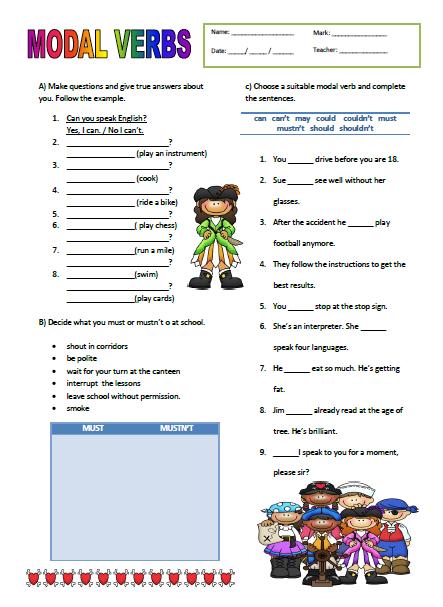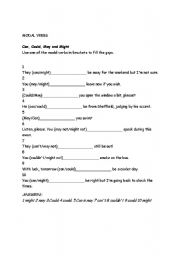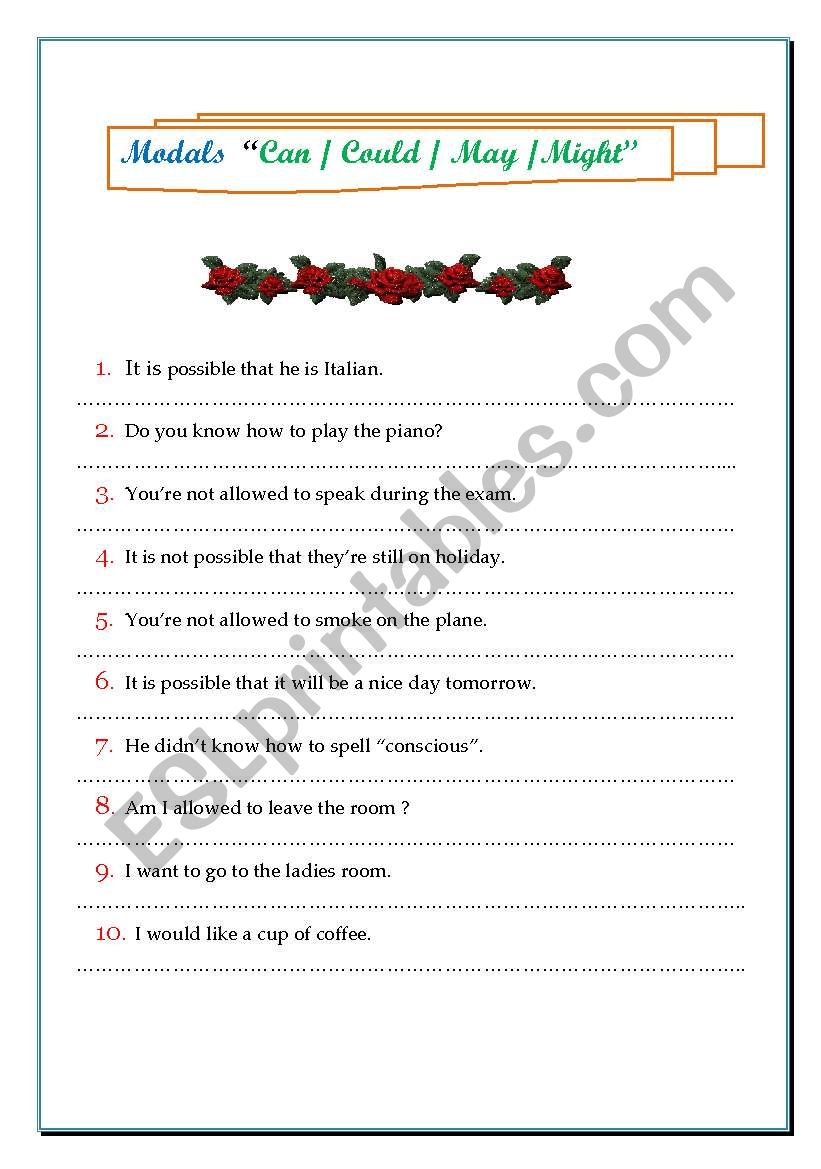
HEADLINES / Today / November 3, 2024
Modal Verbs Must Can T May Might Could Worksheet In 2023 Verb
Modal verbs of deduction – must, may, might, could, can’t: Exercise 1. Choose all the correct modal verbs of deduction for each gap below. In some sentences there are TWO possible correct answers. Page 1 of 2. 1 Paul is behaving in a very unusual way. I think he ______ again. a. can't drink. b. can be drinking. c. might be drinking.. Modal verbs - worksheets, printable exercises pdf, handouts.: Modal verbs - worksheets. Can, can't, could, couldn't, must, mustn't. Modal verbs 1.

Modal Verbs - Can, Can't, Could And Couldn't | English Language ...
Modal verbs 2. Modal verbs 3. Modal verbs - obligation. Ability and permission - worksheet. Modal verbs - pdf handout. Modal verbs - exercises.. Modal Verbs (Must, can't, may, might, could) - Liveworksheets.com: The instructions guide students on how to use modal verbs effectively in different contexts. By providing a breakdown of the usage of modal verbs such as Must, can't, may, might, could, the instructions help students understand the varying degrees of certainty and possibility associated with each modal verb..

Modal Verbs Elementary Worksheet
English grammar: Modal Verbs: can, could, may, might, should ...: MODAL and SEMI-MODAL Verbs in English: can, could, may, might, must, mustn't, should, ought to, shall, will Modal verbs are a type of auxiliary verb which express the mood of another verb. They are used to express ideas such as: possibility, prediction, speculation, deduction and necessity.. Modal Verbs (Must, can't, may, might, could) - Liveworksheets.com: Modal Verbs (Must, can't, may, might, could) 999257 worksheets by GemaDG .Modal Verbs (Must, can't, may, might, could) interactive worksheet Live Liveworksheets transforms your traditional printable worksheets into self-correcting interactive exercises that the students can do online and send to the teacher..

Modal Verbs - Can / Could / May / Might - ESL Worksheet By Natie84
Modals of deduction: might, may, can't, must - Liveworksheets.com: Country: Argentina. School subject: English as a Second Language (ESL) (1061958) Main content: Modals (2012923) From worksheet author: modals of deduction might, may, can't must. Other contents: modals of deduction. Worksheet description: Objective Explanation: The objective of this worksheet is to help students understand and practice m.... Intermediate grammar exercise (B1 level): modal verbs for ...: English grammar practice exercise, intermediate level. In this exercise you will practise using modal verbs to express present probability: must, can't, could, may, might. Exercise instructions Fill in each gap using must, can't, could, may or might. There is a grammar explanation at the bottom of the page. Example Someone is knocking on the .... Modal verbs of deduction – must, might, could, can’t: Must, can’t. We use must when we are sure, or quite sure, that something is true. You must be tired after the long journey. (=I’m sure you are tired) I’m sure I had the keys when I left. They must be in the car. But we use can’t (NOT mustn’t) when we are sure, or quite sure, that something is not true. We’ve been walking for hours..

MODALS "CAN / COULD / MAY / MIGHT " - ESL Worksheet By Nikigia
Modal Verbs (Must, can't, may, might, could) - Liveworksheets.com
The instructions guide students on how to use modal verbs effectively in different contexts. By providing a breakdown of the usage of modal verbs such as Must, can't, may, might, could, the instructions help students understand the varying degrees of certainty and possibility associated with each modal verb.
Intermediate grammar exercise (B1 level): modal verbs for ...
English grammar practice exercise, intermediate level. In this exercise you will practise using modal verbs to express present probability: must, can't, could, may, might. Exercise instructions Fill in each gap using must, can't, could, may or might. There is a grammar explanation at the bottom of the page. Example Someone is knocking on the ...
Modals of deduction: might, may, can't, must - Liveworksheets.com
Country: Argentina. School subject: English as a Second Language (ESL) (1061958) Main content: Modals (2012923) From worksheet author: modals of deduction might, may, can't must. Other contents: modals of deduction. Worksheet description: Objective Explanation: The objective of this worksheet is to help students understand and practice m...
English grammar: Modal Verbs: can, could, may, might, should ...
MODAL and SEMI-MODAL Verbs in English: can, could, may, might, must, mustn't, should, ought to, shall, will Modal verbs are a type of auxiliary verb which express the mood of another verb. They are used to express ideas such as: possibility, prediction, speculation, deduction and necessity.
Modal verbs of deduction – must, may, might, could, can’t
Exercise 1. Choose all the correct modal verbs of deduction for each gap below. In some sentences there are TWO possible correct answers. Page 1 of 2. 1 Paul is behaving in a very unusual way. I think he ______ again. a. can't drink. b. can be drinking. c. might be drinking.
Modal verbs - worksheets, printable exercises pdf, handouts.
Modal verbs - worksheets. Can, can't, could, couldn't, must, mustn't. Modal verbs 1. Modal verbs 2. Modal verbs 3. Modal verbs - obligation. Ability and permission - worksheet. Modal verbs - pdf handout. Modal verbs - exercises.
Modal verbs of deduction – must, might, could, can’t
Must, can’t. We use must when we are sure, or quite sure, that something is true. You must be tired after the long journey. (=I’m sure you are tired) I’m sure I had the keys when I left. They must be in the car. But we use can’t (NOT mustn’t) when we are sure, or quite sure, that something is not true. We’ve been walking for hours.
Modal Verbs (Must, can't, may, might, could) - Liveworksheets.com
Modal Verbs (Must, can't, may, might, could) 999257 worksheets by GemaDG .Modal Verbs (Must, can't, may, might, could) interactive worksheet Live Liveworksheets transforms your traditional printable worksheets into self-correcting interactive exercises that the students can do online and send to the teacher.
Related for Modal Verbs Must Can T May Might Could Worksheet In 2023 Verb
It is a capital mistake to theorize before one has data. Insensibly one begins to twist facts to suit theories, instead of theories to suit facts.
Keep Yourself Updated By Following Our Stories From The Whole World
Keep yourself updated with the latest stories from across the globe! Our platform brings you real-time insights and breaking news, covering everything from major world events to inspiring local stories. By following our stories, you’ll stay informed on a diverse range of topics and perspectives from around the world. Whether it’s political shifts, cultural milestones, or groundbreaking innovations, we ensure you’re always connected to what matters most. Dive into our global coverage and stay informed, no matter where you are!



